Alexander the Great on PTOLEMY I Soter Silver Tetradrachm Greek Coin NGC i68287
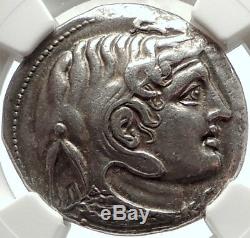
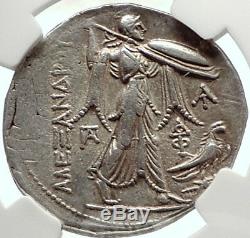
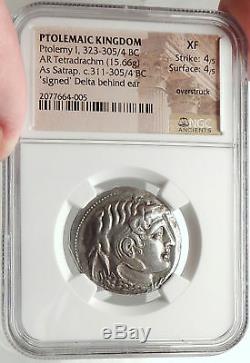
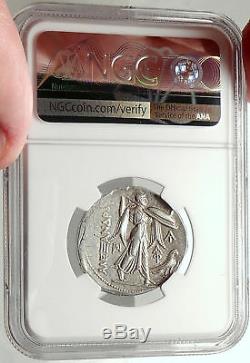
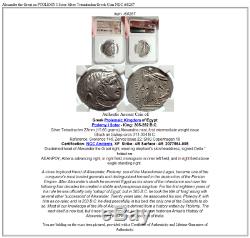


Item: i68287 Authentic Ancient Coin of. Of Egypt Ptolemy I Soter.
Silver Tetradrachm 27mm (15.66 grams) Alexandria mint, first intermediate weight issue Struck as Satrap circa 311-304 B. Reference: Svoronos 146; Zervos Issue 22; SNG Copenhagen 18 Certification: NGC Ancients. XF Strike: 4/5 Surface: 4/5 2077664-005 Diademed head of Alexander the Great right, wearing elephant's skin headdress; signed Delta'' behind ear.
AEANPOY, Athena advancing right; in right field, monogram in inner left field, and in right field above eagle standing right. A close boyhood friend of Alexander, Ptolemy, son of the Macedonian Lagus, became one of the conqueror's most trusted generals and distinguished himself in the destruction of the Persian Empire. After Alexander's death he received Egypt as his share of the inheritance and over the following four decades he created a stable and prosperous kingdom. For the first eighteen years of his rule he was officially only'satrap' of Egypt, but in 305 B. He took the title of'king' along with several other'successors' of Alexander.
Twenty years later, he associated his son, Ptolemy II, with him as co-ruler, and in 283 B. He died peacefully in his bed, the only one of the Diadochi to do so. Most of our knowledge of the life of Alexander is derived from a history written by Ptolemy. The work itself is now lost, but it was the main source for the Roman historian Arrian's History of Alexander and the Indike, an account of India. Alexander III of Macedon (20/21 July 356 BC - 10/11 June 323 BC), commonly known as Alexander the Great , was a king (basileus) of the Ancient Greek kingdom of Macedon and a member of the Argead dynasty.Born in Pella in 356 BC, Alexander succeeded his father, Philip II, to the throne at the age of twenty. He spent most of his ruling years on an unprecedented military campaign through Asia and northeast Africa, and by the age of thirty he had created one of the largest empires of the ancient world, stretching from Greece to northwestern India. He was undefeated in battle and is widely considered one of history's most successful military commanders.
During his youth, Alexander was tutored by the philosopher Aristotle until the age of 16. After Philip's assassination in 336 BC, Alexander succeeded his father to the throne and inherited a strong kingdom and an experienced army. Alexander was awarded the generalship of Greece and used this authority to launch his father's Panhellenic project to lead the Greeks in the conquest of Persia. In 334 BC, he invaded the Achaemenid Empire, and began a series of campaigns that lasted ten years.
Following the conquest of Asia Minor, Alexander broke the power of Persia in a series of decisive battles, most notably the battles of Issus and Gaugamela. He subsequently overthrew the Persian King Darius III and conquered the Achaemenid Empire in its entirety.At that point, his empire stretched from the Adriatic Sea to the Indus River. Seeking to reach the "ends of the world and the Great Outer Sea", he invaded India in 326 BC, but eventually turned back at the demand of his homesick troops. Alexander died in Babylon in 323 BC, the city he planned to establish as his capital, without executing a series of planned campaigns that would have begun with an invasion of Arabia. In the years following his death, a series of civil wars tore his empire apart, resulting in several states ruled by the Diadochi, Alexander's surviving generals and heirs.
Alexander's legacy includes the cultural diffusion his conquests engendered, such as Greco-Buddhism. He founded some twenty cities that bore his name, most notably Alexandria in Egypt. Alexander's settlement of Greek colonists and the resulting spread of Greek culture in the east resulted in a new Hellenistic civilization, aspects of which were still evident in the traditions of the Byzantine Empire in the mid-15th century and the presence of Greek speakers in central and far eastern Anatolia until the 1920s. Alexander became legendary as a classical hero in the mold of Achilles, and he features prominently in the history and mythic traditions of both Greek and non-Greek cultures. He became the measure against which military leaders compared themselves, and military academies throughout the world still teach his tactics. He is often ranked among the most influential people in human history, along with his teacher Aristotle. Ptolemy I Soter "Ptolemy the Savior"; c. 367 BC - 283/2 BC, also known as Ptolemy of Lagus , was a Macedonian Greek general under Alexander the Great, one of the three Diadochi who succeeded to his empire. Ptolemy became ruler of Egypt (323-283/2 BC) and founded a dynasty which ruled it for the next three centuries, turning Egypt into a Hellenistic kingdom and Alexandria into a center of Greek culture.He assimilated some aspects of Egyptian culture, however, assuming the traditional title pharaoh in 305/4 BC. The use of the title of pharaoh was often situational: pharaoh was used for an Egyptian audience, and Basileus for a Greek audience, as exemplified by Egyptian coinage.
Like all Macedonian nobles, Ptolemy I Soter claimed descent from Heracles, the mythical founder of the Argead dynasty that ruled Macedon. Ptolemy's mother was Arsinoe of Macedon, and, while his father is unknown, ancient sources variously describe him either as the son of Lagus, a Macedonian nobleman, or as an illegitimate son of Philip II of Macedon (which, if true, would have made Ptolemy the half-brother of Alexander), but it is possible that this is a later myth fabricated to glorify the Ptolemaic dynasty. However the genealogical strands preserved in a number of accounts state Ptolemy I is presented as having direct blood relationships with the Argead kings. Satyrus the Peripatetic, traced the partrilinear descent of Arsinoe directly through Macedonian kings, back to Hercules. Ptolemy was one of Alexander's most trusted generals, and was among the seven somatophylakes (bodyguards) attached to his person. He was a few years older than Alexander and had been his intimate friend since childhood. He was succeeded by his son Ptolemy II Philadelphus. Ptolemy served with Alexander from his first campaigns, and played a principal part in the later campaigns in Afghanistan and India. He participated in the Battle of Issus, commanding troops on the left wing under the authority of Parmenion. Later he accompanied Alexander during his journey to the Oracle in the Siwa Oasis where he was proclaimed a son of Zeus. Ptolemy had his first independent command during the campaign against the rebel Bessus whom Ptolemy captured and handed over to Alexander for execution. During Alexander's campaign in the Indian subcontinent, Ptolemy was in command of the advance guard at the siege of Aornos and fought at the Battle of the Hydaspes River. When Alexander died in 323 BC, Ptolemy is said to have instigated the resettlement of the empire made at Babylon.Through the Partition of Babylon, he was appointed satrap of Egypt, under the nominal kings Philip III Arrhidaeus and the infant Alexander IV; the former satrap, the Greek Cleomenes, stayed on as his deputy. Ptolemy quickly moved, without authorization, to subjugate Cyrenaica. By custom, kings in Macedonia asserted their right to the throne by burying their predecessor. Probably because he wanted to pre-empt Perdiccas, the imperial regent, from staking his claim in this way, Ptolemy took great pains in acquiring the body of Alexander the Great, placing it temporarily in Memphis, Egypt. Ptolemy then openly joined the coalition against Perdiccas.
Perdiccas appears to have suspected Ptolemy of aiming for the throne himself, and may have decided that Ptolemy was his most dangerous rival. Ptolemy executed Cleomenes for spying on behalf of Perdiccas - this removed the chief check on his authority, and allowed Ptolemy to obtain the huge sum that Cleomenes had accumulated. In 321 BC, Perdiccas attempted to invade Egypt, only to fall at the hands of his own men.Ptolemy's decision to defend the Nile against Perdiccas's attempt to force it ended in fiasco for Perdiccas, with the loss of 2,000 men. This failure was a fatal blow to Perdiccas' reputation, and he was murdered in his tent by two of his subordinates. Ptolemy immediately crossed the Nile, to provide supplies to what had the day before been an enemy army. Ptolemy was offered the regency in place of Perdiccas; but he declined. Ptolemy was consistent in his policy of securing a power base, while never succumbing to the temptation of risking all to succeed Alexander.
In the long wars that followed between the different Diadochi, Ptolemy's first goal was to hold Egypt securely, and his second was to secure control in the outlying areas: Cyrenaica and Cyprus, as well as Syria, including the province of Judea. His first occupation of Syria was in 318, and he established at the same time a protectorate over the petty kings of Cyprus. When Antigonus One-Eye, master of Asia in 315, showed dangerous ambitions, Ptolemy joined the coalition against him, and on the outbreak of war, evacuated Syria.
In Cyprus, he fought the partisans of Antigonus, and re-conquered the island (313). A revolt in Cyrene was crushed the same year. In 312, Ptolemy and Seleucus, the fugitive satrap of Babylonia, both invaded Syria, and defeated Demetrius Poliorcetes ("besieger of cities"), the son of Antigonus, in the Battle of Gaza.
Again he occupied Syria, and again-after only a few months, when Demetrius had won a battle over his general, and Antigonus entered Syria in force-he evacuated it. In 311, a peace was concluded between the combatants. Soon after this, the surviving 13-year-old king, Alexander IV, was murdered in Macedonia on the orders of Cassander, leaving the satrap of Egypt absolutely his own master.The peace did not last long, and in 309 Ptolemy personally commanded a fleet that detached the coastal towns of Lycia and Caria from Antigonus, then crossed into Greece, where he took possession of Corinth, Sicyon and Megara (308 BC). In 306, a great fleet under Demetrius attacked Cyprus, and Ptolemy's brother Menelaus was defeated and captured in another decisive Battle of Salamis. Ptolemy's complete loss of Cyprus followed.
The satraps Antigonus and Demetrius now each assumed the title of king; Ptolemy, as well as Cassander, Lysimachus and Seleucus I Nicator, responded by doing the same. In the winter of 306 BC, Antigonus tried to follow up his victory in Cyprus by invading Egypt; but Ptolemy was strongest there, and successfully held the frontier against him.
Ptolemy led no further overseas expeditions against Antigonus. However, he did send great assistance to Rhodes when it was besieged by Demetrius (305/304). Pausanias reports that the grateful Rhodians bestowed the name Soter ("saviour") upon him as a result of lifting the siege.This account is generally accepted by modern scholars, although the earliest datable mention of it is from coins issued by Ptolemy II in 263 BC. When the coalition against Antigonus was renewed in 302, Ptolemy joined it, and invaded Syria a third time, while Antigonus was engaged with Lysimachus in Asia Minor. On hearing a report that Antigonus had won a decisive victory there, he once again evacuated Syria. But when the news came that Antigonus had been defeated and slain by Lysimachus and Seleucus at the Battle of Ipsus in 301, he occupied Syria a fourth time.
The other members of the coalition had assigned all Syria to Seleucus, after what they regarded as Ptolemy's desertion, and for the next hundred years, the question of the ownership of southern Syria i. Judea produced recurring warfare between the Seleucid and Ptolemaic dynasties. Henceforth, Ptolemy seems to have mingled as little as possible in the rivalries between Asia Minor and Greece; he lost what he held in Greece, but reconquered Cyprus in 295/294. Cyrene, after a series of rebellions, was finally subjugated about 300 and placed under his stepson Magas.
In 289, Ptolemy made his son by Berenice-Ptolemy II Philadelphus-his co-regent. His eldest (legitimate) son, Ptolemy Keraunos, whose mother, Eurydice, the daughter of Antipater, had been repudiated, fled to the court of Lysimachus. Ptolemy also had a consort in Thaïs, the Athenian hetaera and one of Alexander's companions in his conquest of the ancient world.
Ptolemy I Soter died in winter 283 or spring 282 at the age of 84. Shrewd and cautious, he had a compact and well-ordered realm to show at the end of forty years of war. His reputation for bonhomie and liberality attached the floating soldier-class of Macedonians and other Greeks to his service, and was not insignificant; nor did he wholly neglect conciliation of the natives. He was a ready patron of letters, founding the Great Library of Alexandria. Lost history of Alexander's campaigns.Ptolemy himself wrote an eyewitness history of Alexander's campaigns (now lost). In the second century AD, Ptolemy's history was used by Arrian of Nicomedia as one of his two main primary sources (alongside the history of Aristobulus of Cassandreia) for his own extant Anabasis of Alexander, and hence large parts of Ptolemy's history can be assumed to survive in paraphrase or précis in Arrian's work. Arrian cites Ptolemy by name on only a few occasions, but it is likely enough that large stretches of Arrian's Anabasis ultimately reflect Ptolemy's version of events. Arrian once names Ptolemy as the author "whom I chiefly follow" (Anabasis 6.2.4), and in his Preface claims that Ptolemy seemed to him to be a particularly trustworthy source, "not only because he was present with Alexander on campaign, but also because he was himself a king, and hence lying would be more dishonourable for him than for anyone else" (Anabasis , Prologue). Ptolemy's lost history was long considered an objective work, distinguished by its straightforward honesty and sobriety, but more recent work has called this assessment into question.
Errington argued that Ptolemy's history was characterised by persistent bias and self-aggrandisement, and by systematic blackening of the reputation of Perdiccas, one of Ptolemy's chief dynastic rivals after Alexander's death. For example, Arrian's account of the fall of Thebes in 335 BC (Anabasis 1.8.1-1.8.8, a rare section of narrative explicitly attributed to Ptolemy by Arrian) shows several significant variations from the parallel account preserved in Diodorus Siculus (17.11-12), most notably in attributing a distinctly unheroic role in proceedings to Perdiccas. Roisman has argued that the case for Ptolemy's blackening of Perdiccas and others has been much exaggerated. Ptolemy personally sponsored the great mathematician Euclid, but found Euclid's seminal work, the Elements , too difficult to study, so he asked if there were an easier way to master it. According to Proclus Euclid famously quipped: Sire, there is no Royal Road to geometry.Ptolemy was played by Virgilio Teixeira in the film Alexander the Great (1956) and by Robert Earley, Elliot Cowan, and Anthony Hopkins in the Oliver Stone film Alexander (2004). The Ptolemaic Kingdom was a Hellenistic kingdom based in Egypt. It was ruled by the Ptolemaic dynasty which started with Ptolemy I Soter's accession after the death of Alexander the Great in 323 BC- and which ended with the death of Cleopatra VII and the Roman conquest in 30 BC.
The Ptolemaic Kingdom was founded in 305 BC by Ptolemy I Soter, who declared himself Pharaoh of Egypt and created a powerful Hellenistic dynasty that ruled an area stretching from southern Seleukid Kingdom to Cyrene and south to Nubia. Alexandria became the capital city and a major center of Greek culture and trade. To gain recognition by the native Egyptian populace, they named themselves the successors to the Pharaohs. The later Ptolemies took on Egyptian traditions by marrying their siblings, had themselves portrayed on public monuments in Egyptian style and dress, and participated in Egyptian religious life.
The Ptolemies had to fight native rebellions and were involved in foreign and civil wars that led to the decline of the kingdom and its final annexation by Rome. Hellenistic culture continued to thrive in Egypt throughout the Roman and Byzantine periods until the Muslim conquest.
World-renowned expert numismatist, enthusiast, author and dealer in authentic ancient Greek, ancient Roman, ancient Byzantine, world coins & more. Ilya Zlobin is an independent individual who has a passion for coin collecting, research and understanding the importance of the historical context and significance all coins and objects represent.
Send me a message about this and I can update your invoice should you want this method. Getting your order to you, quickly and securely is a top priority and is taken seriously here. Great care is taken in packaging and mailing every item securely and quickly. What is a certificate of authenticity and what guarantees do you give that the item is authentic?
You will be very happy with what you get with the COA; a professional presentation of the coin, with all of the relevant information and a picture of the coin you saw in the listing. Additionally, the coin is inside it's own protective coin flip (holder), with a 2x2 inch description of the coin matching the individual number on the COA. Whether your goal is to collect or give the item as a gift, coins presented like this could be more prized and valued higher than items that were not given such care and attention to. When should I leave feedback? Please don't leave any negative feedbacks, as it happens sometimes that people rush to leave feedback before letting sufficient time for their order to arrive. The matter of fact is that any issues can be resolved, as reputation is most important to me. My goal is to provide superior products and quality of service. How and where do I learn more about collecting ancient coins? Visit the Guide on How to Use My Store. For on an overview about using my store, with additional information and links to all other parts of my store which may include educational information on topics you are looking for.The item "Alexander the Great on PTOLEMY I Soter Silver Tetradrachm Greek Coin NGC i68287" is in sale since Thursday, March 29, 2018. This item is in the category "Coins & Paper Money\Coins\ Ancient\Greek (450 BC-100 AD)".
The seller is "highrating_lowprice" and is located in Rego Park, New York. This item can be shipped worldwide.- Certification: NGC
- Certification Number: 2077664-005
- Grade: XF
- Culture: Greek
- Coin Type: Ancient
- Composition: Silver
- Material: Silver
- Denomination: Tetradrachm


